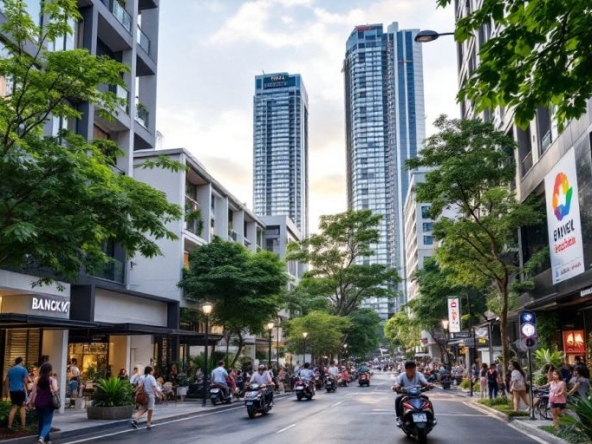Thailand’s real estate sector, valued at approximately US$2 trillion, is poised for a significant transformation due to emerging demographic trends. According to Proud Real Estate Plc, three key megatrends are reshaping the market: multigenerational living, semi-retirement lifestyles, and the hybridisation of hospitality and residential spaces. These shifts are a response to the country’s ageing population and the increasing popularity of second-home tourism.
Key Takeaways
- Multigenerational Living: A growing trend where family members across generations co-decide on property purchases, reflecting a shift in home-buying dynamics.
- Semi-Retirement Lifestyle: An emerging preference among younger generations for phased retirement, leading to a demand for properties that accommodate both work and leisure.
- Hospitality-Residence Hybridisation: The blending of residential and hospitality services, catering to the needs of both local and international buyers.
Demographic Shifts Impacting Real Estate
Thailand is experiencing a notable demographic shift, with the proportion of elderly citizens increasing significantly. The UN World Population report indicates that the over-60 population has doubled from 10% in 2005 to 20% in 2023. By 2029, Thailand is expected to be classified as a "super-aged society," with 20% of its population over 65 years old. This demographic change is coupled with economic challenges, such as the middle-income trap, which has affected the purchasing power of millennials and Gen Z.
The Rise of Multigenerational Living
Proud Real Estate has identified multigenerational households as a key trend in the property market. Currently, 34% of Thai households are multigenerational, a figure expected to rise as the elderly population grows. This trend is not only reshaping housing decisions but also influencing travel and leisure choices. Developers are now rethinking traditional housing models to accommodate these evolving family structures.
- Key Features of Multigenerational Living:
- Flexible home designs that allow for future expansion.
- Consideration of varying needs across generations, such as mobility for older family members and proximity to work for younger ones.
Embracing Semi-Retirement Lifestyles
The concept of semi-retirement is gaining traction in Thailand, particularly among younger generations. A recent study revealed that 66% of Gen Z and millennials prefer phased retirement, with many planning to work part-time during their retirement years. This shift is creating a demand for residential properties that can support both work and leisure activities, as well as integrated medical care facilities.
Hospitality-Residence Hybridisation
Despite a sluggish outlook for housing demand, land prices in central business districts, particularly in Bangkok, continue to rise. The influx of international buyers is shifting property usage from primary residences to secondary homes for semi-vacationing. This trend is leading to the dominance of mixed-use developments that cater to diverse customer needs.
- Examples of Hybrid Developments:
- VEHHA Hua Hin: Offers a high-end living experience with hotel-like amenities, including ocean views and exclusive services.
- ROMM Convent: A luxury wellness residence in Bangkok, featuring holistic health facilities and partnerships with prestigious hospitals for integrated medical care.
Conclusion
The transformation of Thailand’s real estate sector is being driven by significant demographic changes and evolving lifestyle preferences. As the market adapts to these megatrends, opportunities for innovation and growth are emerging, positioning the sector for a robust future. The integration of multigenerational living, semi-retirement lifestyles, and hospitality elements into residential offerings is set to redefine the landscape of Thai real estate in the coming years.
Sources
- Population Change in Asia is Set to Transform Thailand’s Real Estate Sector in Coming Years, says Proud Real Estate | Media OutReach Newswire APAC, Media OutReach.
- Population Change in Asia is Set to Transform Thailand’s Real Estate Sector in Coming Years, says Proud Real Estate | Business | indexjournal.com, Index-Journal.




